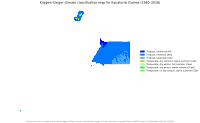
Geography of Equatorial Guinea

This article needs additional citations for verification. (April 2015) |
  | |
| Continent | Africa |
|---|---|
| Coordinates | 2°00′N 10°00′E / 2.000°N 10.000°E |
| Area | Ranked 141st |
| • Total | 28,051 km2 (10,831 sq mi) |
| Coastline | 296 km (184 mi) |
| Borders | 539 km |
| Highest point | Pico Basile, 3,008 m |
| Lowest point | Atlantic Ocean, 0 m |
| Longest river | Benito River |
| Climate | Tropical |
| Natural resources | petroleum, timber, small unexploited deposits of gold, manganese, uranium |
| Environmental issues | drinking water, desertification |
| Exclusive economic zone | 303,509 km2 (117,185 sq mi) |

The Republic of Equatorial Guinea is located in west central Africa. Bioko Island lies about 40 kilometers (24.9 mi) from Cameroon. Annobón Island lies about 595 kilometres (370 mi) southwest of Bioko Island. The larger continental region of Río Muni lies between Cameroon and Gabon on the mainland; it includes the islands of Corisco, Elobey Grande, Elobey Chico, and adjacent islets. The total land area is 28,051 km2 (10,831 sq mi). It has an Exclusive Economic Zone of 303,509 km2 (117,185 sq mi).

Bioko Island, called Fernando Po until the 1970s, is the largest island in the Gulf of Guinea — 2,017 square kilometers (779 sq mi). It is shaped like a boot, with two large volcanic formations separated by a valley that bisects the island at its narrowest point. The 195-kilometer (121 mi) coastline is steep and rugged in the south but lower and more accessible in the north, with excellent harbors at Malabo and Luba, and several scenic beaches between those towns.

On the continent, Río Muni covers 26,003 square kilometers (10,040 sq mi). The coastal plain gives way to a succession of valleys separated by low hills and spurs of the Crystal Mountains. The Rio Benito (Mbini) which divides Río Muni in half, is unnavigable except for a 20-kilometer stretch at its estuary. Temperatures and humidity in Río Muni are generally lower than on Bioko Island.

Annobon Island, named for its discovery on New Year's Day 1472, is a small volcanic island covering 18 square kilometers (6.9 sq mi). The coastline is abrupt except in the north; the principal volcanic cone contains a small lake. Most of the estimated 1,900 inhabitants are fisherman specializing in traditional, smallscale tuna fishing and whaling. The climate is tropical—heavy rainfall, high humidity, and frequent seasonal changes with violent windstorms.

Location: Central Africa, bordering the Bight of Biafra, between Cameroon and Gabon.

Area and boundaries
- Area
-
- Total: 28,051 km²
- country rank in the world: 141st
- Land: 28,051 km²
- Water: negligible km²
- Total: 28,051 km²
Equatorial Guinea's land boundaries total 539 km. It borders Cameroon (189 km) in the north and Gabon (350 km) in the east and south.

- Area comparative
-
- Australia comparative: approximately 3/7 the size of Tasmania
- Canada comparative: approximately 1/2 the size of Nova Scotia
- United Kingdom comparative: approximately 1/3 larger than Wales
- United States comparative: slightly larger than Massachusetts
- EU comparative: slightly smaller than Belgium
Maritime claims: territorial sea: 12 nmi (22.2 km; 13.8 mi)

Exclusive economic zone: 303,509 km2 (117,185 sq mi) with 200 nmi (370.4 km; 230.2 mi)

Terrain

| Land Use (2012 est.) | |
|---|---|
| Arable land: | 4.28% |
| Permanent crops: | 2.14% |
| Other: | 93.58% |

Coastal plains rise to interior hills; islands are volcanic.

Total renewable water resources: 26 km3 (2011)

Natural hazards: violent windstorms, flash floods

Environment — current issues: tap water is not potable; deforestation

Environment — international agreements: party to: Biodiversity, Desertification, Endangered Species, Hazardous Wastes, Law of the Sea, Marine Dumping, Ozone Layer Protection, Ship Pollution, Wetlands

Geography note: insular and continental regions rather widely separated

Climate


The climate of both the continental region and the islands is typically equatorial, with high temperatures, heavy rainfall, and much cloud cover most of the year. Local variations are due to differences in altitude and proximity to the sea. The wet seasons in the continental region are from February to June and from September to December. Rainfall is higher on the coast than inland. In Bata the rainiest months are September, October, and November, with rainfall averaging more than 94 in (2,388 mm) a year. At Calatrava, farther south on the coast, it sometimes reaches 180 in (4,572 mm). Inland, however, rainfall diminishes; Mikomeseng, for example, receives only about 58 in (1,473 mm). The average annual temperature is about 79 °F (26.1 °C) and is fairly constant throughout the year. The temperature maxima are somewhat lower than in Bioko. The relative humidity, however, is higher than in Bioko. Bioko has a rather debilitating climate. The so-called dry season lasts from November to March, and the rest of the year is rainy. The average annual temperature of about 77 °F (25 °C) varies little throughout the year. Afternoon temperatures reach the high 80s °F (low 30s °C) and drop to only about 70 °F (21.1 °C) at night. Most of the time the sky is cloudy and overcast. Extreme rainfall occurs in the south, with rain brought by monsoon winds amounting to about 450 in (11,430 mm) a year around San Antonio de Ureca.

| Climate data for Malabo | |||||||||||||
|---|---|---|---|---|---|---|---|---|---|---|---|---|---|
| Month | Jan | Feb | Mar | Apr | May | Jun | Jul | Aug | Sep | Oct | Nov | Dec | Year |
| Record high °C (°F) | 34.2 (93.6) |
35.3 (95.5) |
34.5 (94.1) |
36.5 (97.7) |
34.0 (93.2) |
32.5 (90.5) |
31.5 (88.7) |
32.0 (89.6) |
32.5 (90.5) |
32.5 (90.5) |
32.5 (90.5) |
33.5 (92.3) |
36.5 (97.7) |
| Mean daily maximum °C (°F) | 31.1 (88.0) |
31.8 (89.2) |
31.3 (88.3) |
31.3 (88.3) |
30.5 (86.9) |
29.5 (85.1) |
28.4 (83.1) |
28.0 (82.4) |
28.1 (82.6) |
28.8 (83.8) |
29.8 (85.6) |
30.8 (87.4) |
30.0 (86.0) |
| Daily mean °C (°F) | 26.9 (80.4) |
27.7 (81.9) |
27.6 (81.7) |
27.2 (81.0) |
26.7 (80.1) |
25.9 (78.6) |
25.3 (77.5) |
25.0 (77.0) |
25.1 (77.2) |
25.5 (77.9) |
26.1 (79.0) |
26.6 (79.9) |
26.3 (79.3) |
| Mean daily minimum °C (°F) | 23.0 (73.4) |
23.9 (75.0) |
24.1 (75.4) |
23.8 (74.8) |
23.5 (74.3) |
23.3 (73.9) |
23.2 (73.8) |
23.1 (73.6) |
22.8 (73.0) |
22.9 (73.2) |
23.0 (73.4) |
22.7 (72.9) |
23.3 (73.9) |
| Record low °C (°F) | 17.0 (62.6) |
16.5 (61.7) |
15.5 (59.9) |
16.5 (61.7) |
15.0 (59.0) |
18.0 (64.4) |
17.1 (62.8) |
15.0 (59.0) |
18.5 (65.3) |
17.6 (63.7) |
19.0 (66.2) |
17.5 (63.5) |
15.0 (59.0) |
| Average rainfall mm (inches) | 28.9 (1.14) |
70.6 (2.78) |
102.7 (4.04) |
155.7 (6.13) |
227.1 (8.94) |
260.8 (10.27) |
202.0 (7.95) |
177.1 (6.97) |
250.1 (9.85) |
254.3 (10.01) |
100.3 (3.95) |
39.6 (1.56) |
1,869.1 (73.59) |
| Average rainy days (≥ 1.0 mm) | 3.5 | 4.6 | 9.8 | 12.0 | 17.2 | 19.0 | 17.5 | 14.8 | 20.6 | 19.5 | 10.3 | 4.0 | 152.7 |
| Average relative humidity (%) | 83 | 83 | 84 | 84 | 87 | 89 | 90 | 89 | 91 | 90 | 88 | 84 | 87 |
| Mean monthly sunshine hours | 120.9 | 121.5 | 108.5 | 114.0 | 99.2 | 66.0 | 43.4 | 52.7 | 48.0 | 71.3 | 87.0 | 117.8 | 1,050.3 |
| Mean daily sunshine hours | 3.9 | 4.3 | 3.5 | 3.8 | 3.2 | 2.2 | 1.4 | 1.7 | 1.6 | 2.3 | 2.9 | 3.8 | 2.9 |
| Source: Deutscher Wetterdienst[2] | |||||||||||||
| Climate data for Bata (1956–1965) | |||||||||||||
|---|---|---|---|---|---|---|---|---|---|---|---|---|---|
| Month | Jan | Feb | Mar | Apr | May | Jun | Jul | Aug | Sep | Oct | Nov | Dec | Year |
| Record high °C (°F) | 33.5 (92.3) |
35.6 (96.1) |
34.1 (93.4) |
34.1 (93.4) |
33.2 (91.8) |
32.8 (91.0) |
31.8 (89.2) |
31.5 (88.7) |
32.5 (90.5) |
32.0 (89.6) |
32.4 (90.3) |
33.0 (91.4) |
35.6 (96.1) |
| Mean daily maximum °C (°F) | 30.5 (86.9) |
31.1 (88.0) |
31.3 (88.3) |
31.0 (87.8) |
30.7 (87.3) |
29.7 (85.5) |
28.8 (83.8) |
28.9 (84.0) |
29.1 (84.4) |
29.1 (84.4) |
29.6 (85.3) |
30.1 (86.2) |
30.0 (86.0) |
| Daily mean °C (°F) | 25.6 (78.1) |
25.8 (78.4) |
25.7 (78.3) |
25.6 (78.1) |
25.6 (78.1) |
25.0 (77.0) |
24.1 (75.4) |
24.2 (75.6) |
24.6 (76.3) |
24.8 (76.6) |
25.2 (77.4) |
25.0 (77.0) |
25.1 (77.2) |
| Mean daily minimum °C (°F) | 20.7 (69.3) |
20.4 (68.7) |
20.1 (68.2) |
20.1 (68.2) |
20.6 (69.1) |
20.2 (68.4) |
19.4 (66.9) |
19.6 (67.3) |
20.0 (68.0) |
20.5 (68.9) |
20.8 (69.4) |
20.0 (68.0) |
20.2 (68.4) |
| Record low °C (°F) | 15.3 (59.5) |
13.7 (56.7) |
14.5 (58.1) |
12.5 (54.5) |
12.5 (54.5) |
15.5 (59.9) |
12.5 (54.5) |
14.2 (57.6) |
15.6 (60.1) |
15.5 (59.9) |
14.5 (58.1) |
14.5 (58.1) |
12.5 (54.5) |
| Average rainfall mm (inches) | 116 (4.6) |
102 (4.0) |
205 (8.1) |
292 (11.5) |
285 (11.2) |
90 (3.5) |
25 (1.0) |
26 (1.0) |
221 (8.7) |
457 (18.0) |
306 (12.0) |
109 (4.3) |
2,234 (87.9) |
| Average rainy days (≥ 0.1 mm) | 9 | 8 | 14 | 16 | 17 | 7 | 3 | 5 | 16 | 24 | 18 | 10 | 147 |
| Mean monthly sunshine hours | 201.5 | 192.1 | 173.6 | 177.0 | 189.1 | 147.0 | 142.6 | 142.6 | 114.0 | 114.7 | 141.0 | 186.0 | 1,921.2 |
| Mean daily sunshine hours | 6.5 | 6.8 | 5.6 | 5.9 | 6.1 | 4.9 | 4.6 | 4.6 | 3.8 | 3.7 | 4.7 | 6.0 | 5.3 |
| Source: Deutscher Wetterdienst[3] | |||||||||||||
Extreme points
This is a list of the extreme points of Equatorial Guinea, the points that are farther north, south, east or west than any other location.

- Northernmost point — Punta Europa, Bioko Island
- Easternmost point — the entire length of the eastern border with Gabon, which runs in a straight line
- Southernmost point — A Dyibó, Annobón Island
- Westernmost point — Punta Dyiscoj, Annobón Island
See also
References
- ^ Anthropogenic modification of forests means only 40% of remaining forests have high ecosystem integrity — Supplementary material, Nature Communications volume 11 numéro 1 2020 ISSN 2041-1723
- ^ "Klimatafel von Malabo (Santa Isabel) / Insel Bioko (Fernando Póo) / Äquatorial-Guinea" (PDF). Baseline climate means (1961–1990) from stations all over the world (in German). Deutscher Wetterdienst. Retrieved 19 December 2018.
- ^ "Klimatafel von Bata / Insel Mbini / Äquatorial-Guinea" (PDF). Baseline climate means (1961-1990) from stations all over the world (in German). Deutscher Wetterdienst. Retrieved 25 January 2016.
![]() This article incorporates public domain material from The World Factbook. CIA.
This article incorporates public domain material from The World Factbook. CIA.

See what we do next...
OR
By submitting your email or phone number, you're giving mschf permission to send you email and/or recurring marketing texts. Data rates may apply. Text stop to cancel, help for help.
Success: You're subscribed now !
